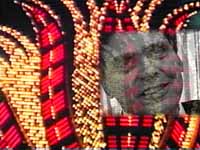
A young boy Hope talks about his experiences in South Africa |

Another episode, "My Name is Hope," takes a different approach, painting a poignant picture of alienation in South Africa. The camera moves through the slums with freedom, showing us the drug abuse and the cramped quarters, contrasting the tin roofs of shanty town with the clean-and-neat middle class dwellings only a few yards away. In these scenes, Planet Street uses a slow, deliberate approach, largely (thankfully) dropping the MTV-inspired visuals, dissolves, and fades, and bringing us up close to the country and its people. Best of all, we get to meet a young South African boy named Hope, who doesn't know the meaning of racism and expresses an eternally hopeful attitude. He doesn't think less of the whites for their policy of apartheid and only hopes they never do the same thing again.
In addition, Planet Street features an astounding short film by Guy Roland called "Pacer." The film is composed almost exclusively of single frame shots of buildings, bridges, fences, and pillars. These images are edited together so that the camera appears to be rolling through the city at breakneck speed, discovering surprising rhythms in the structures. Rows of windows on an apartment building suddenly take on a unique and beautiful artistry of their own. A simple concrete pillar in a parking garage becomes beautiful as the camera moves around it and the lighting changes. "Pacer" is a remarkable film.
In its best episodes, Planet Street shows great hope for the future of Channel Zero; however, I can't help but wonder if the linear nature of video is really the best venue for this project. Channel Zero screams for a non-linear approach that would allow users to move through the news magazine at their own pace and choose stories to view on their own. Channel Zero already has a Web site (www.channel-zero.com) which gives us a taste of their intentions, but only after band width issues are resolved on the Web can Channel Zero truly deliver their new magazine by way of the Web. A CD-ROM version of the news magazine makes more sense than video, particularly with the interactivity that a software version would provide. Whatever the case, keep your eyes on Channel Zero.

[The Channel Zero logo]
Channel Zero: Planet Street (volume 1/issue 1) is available at Tower Records. If you're having trouble finding Planet Street, you can contact Channel Zero directly via the World Wide Web at www.channel-zero.com
|

 Channel Zero offers viewers an alternative to mainstream information sources. By creating a product that is free of corporate sponsorship and advertising, the creators of Channel Zero intend to create an "alternative universe to that of broadcast television by producing high-impact and design-driven programs." In addition, Channel Zero intends to bring you "stories from our streets, more dramatic and impacting than anything you could create in a million dollar studio."
Channel Zero offers viewers an alternative to mainstream information sources. By creating a product that is free of corporate sponsorship and advertising, the creators of Channel Zero intend to create an "alternative universe to that of broadcast television by producing high-impact and design-driven programs." In addition, Channel Zero intends to bring you "stories from our streets, more dramatic and impacting than anything you could create in a million dollar studio."



